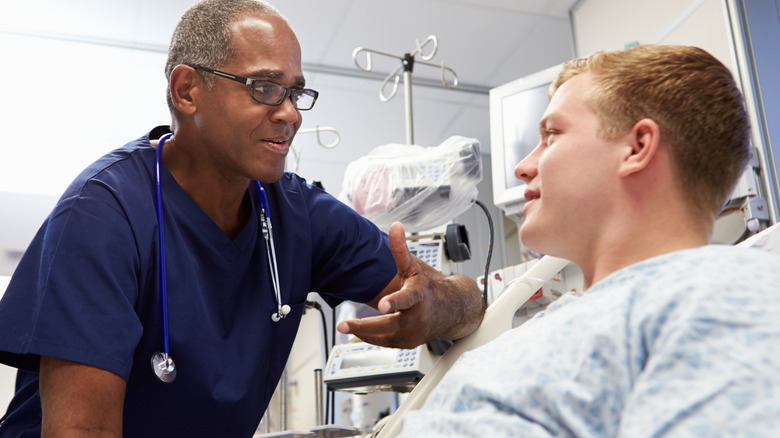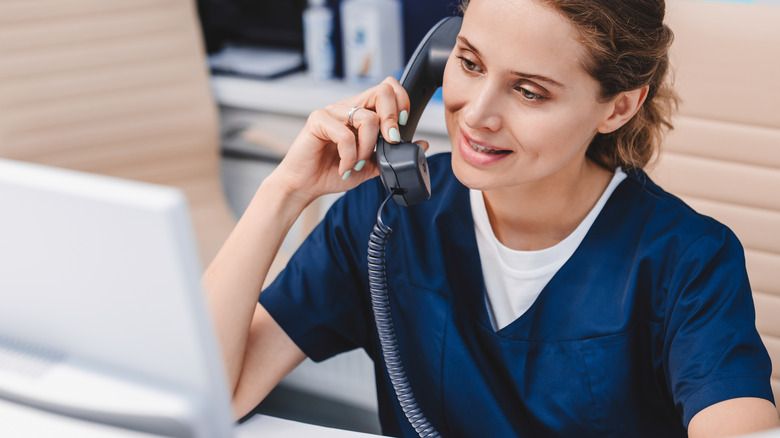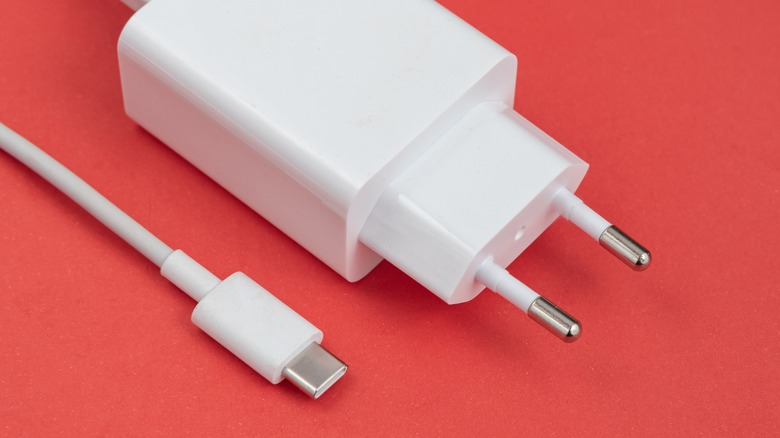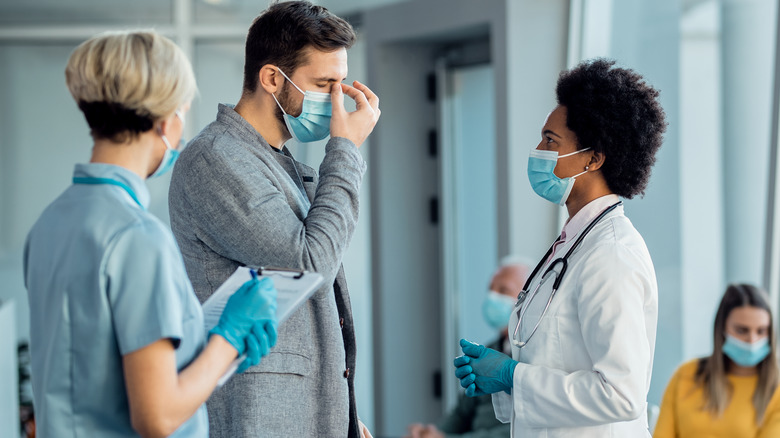Things You Should Never Do In The Emergency Room
Emergency rooms perform a vital function in our society, and there's no denying they're busy places. In 2019, well over a fifth of all 18-to-44-year-olds visited an emergency room, with more than a quarter of over-65's presenting at emergency departments across the country in the same year (via Statista).
For most people, though, emergency room visits are infrequent experiences, and if you haven't been to one in a while, it's easy to forget what it's like to be there. Furthermore, they're often stressful moments in a person's life, and that's before considering that hospitals themselves can be anxiety-inducing for many people (per Healthline). With all of these factors in play, it can be challenging to remember how to behave in an emergency room.
The things that you do and don't do when you visit an emergency department can not only make your experience more comfortable and less stress-inducing, but could also ease your treatment and ensure that you get the best care possible. That's why we put together this guide for things you should never do when you visit the emergency room.
Don't forget to bring your essentials
Emergency room visits, as you might expect, are usually sudden experiences, where people need care pretty much immediately. And in the rush to seek treatment for your medical condition, it's natural to forget that there are a few things you'll need to bring with you to make your experience faster and easier.
Your emergency room visit will usually involve several steps (unless your reasons for visiting are urgent and life-threatening, in which case the treatment will be immediate), and for these, you'll need your health insurance information, says WebMD. It's also a good idea to bring your credit card along (should you be on a copay or deductible plan) to pay for any treatment or medication prescribed. The hospital may also need to verify your identity against your health insurance, so make sure to bring your photo ID with you as well.
Depending on the severity of your condition, it's likely that you'll have to provide next of kin information. You should also be prepared to share information about any allergies you have or medication you're taking. Finally, don't forget to bring along any living aids you might use (like a walker or cane, hearing aid, or glasses), as these will make your experience in the emergency room way more comfortable.
You should never assume it's going to be quick
Let's be real here: When we go to an emergency room, we all want to be in and out of there as fast as possible. But assuming that it's going to be a quick experience could leave you disappointed, frustrated, and underprepared.
Depending on where you live in the U.S., average emergency room wait times can be several hours in length, with folks in Maryland facing an average wait of 228 minutes for nonurgent care, according to a survey completed by AutoInsurance. On the shorter end of the spectrum, people in North Dakota might be pleased to hear that their average wait time is just 104 minutes — but on average, across the country, you're looking at a little over two hours before you're seen.
It's important to remember that these times won't be as long if you require immediate care, as emergency rooms have different priority levels for treatment. As such, if you present with a condition that needs resuscitation or emergent care, you're likely to be seen pretty quickly. For non-urgent cases, though, it's advisable to mentally prepare yourself for the long wait, and to take some entertainment with you (like a book) to pass the time.
Don't lie about your condition
If you're going to an emergency room, it's pretty safe to assume that you're going to want care fast. But in the pursuit of medical attention, the one thing you shouldn't do is talk up your symptoms.
By lying about your condition or insinuating that it's worse than it is, you may well achieve your goal of getting in front of a doctor quicker, but doing so may also cause healthcare staff to start investigating a problem that isn't there (per Prevention). This results in wasted time, both for you and the doctor.
And the worst part? Even if you see sense and tell them the truth after lying, things could remain complicated. "Even if you dial back what you said, we may have to pursue your exaggerated complaint to cover ourselves," according to "When Doctors Don't Listen: How to Avoid Misdiagnoses and Unnecessary Tests" author and emergency physician Leana Wen (via Prevention). This means that you may have to wait even longer before you get the treatment that you need. Keep it simple, people — just tell the truth.
You shouldn't try and address other health concerns
If it's been a while since you've been to the doctor, and you may have accumulated a few aches, pains, or health concerns that you've been meaning to follow up on. Hey, it happens. But as much as you can, if you end up in an emergency room before booking a doctor's appointment for health concerns, don't try and use the opportunity to talk about them. As Los Angeles-based board-certified emergency physician Michael Daignault states, emergency rooms are time-pressured and need to focus their resources on immediate and specific treatment, and they likely won't have the capacity to treat everything you're worried about (per USA Today).
With this in mind, try and keep things focused on the issue at hand, however tempting it may be to branch out to other concerns. Your doctor may gently try to guide you into being as precise as possible; try to go with them without feeling offended, Daignault says. That's not to say that you can't talk about any other health conditions while you're being assessed, of course — but bear in mind that your emergency room medic may refer you to your primary caregiver for anything other than the reason you visited the ED in the first place.
Don't forget to ask your doctor to call before you arrive
If you're heading to an emergency room for an unexpected and sudden reason, you may not have time to speak with your primary physician first. But in a lot of situations, your doctor will actually be the one who instructs you to go there in the first place, according to Michigan Health.
If that's the case, never forget to ask them to call ahead and advise the staff there about why you're heading in. While this may not speed things up for you on arrival, your doctor will be able to inform the emergency room as to exactly why you require treatment, and any specific things they think the doctors should be on the lookout for.
Additionally, emergency room visits can often be stressful situations. Amidst your anxiety about being in an ED, you may forget crucial details that your doctor can relay ahead of time. A call from your doctor to the emergency department will ensure that they have your complete medical history, which is important because it could affect how they administer your treatment.
Never be scared to ask questions
We must trust our doctors to provide the best healthcare possible. However, even if you don't know a great deal about healthcare, it's still important to assess what they're doing yourself. This is true not only when it comes to your primary physician, but also any treatment you receive in the emergency room. "Don't assume that there's only one right way," advises New Jersey-based patient advocacy practice Healthcare Connect's owner Jacqueline O'Doherty (via Prevention). "As a patient, you have the right to know your treatment options and that you have the right to choose."
The best way to determine this is to ask questions as your treatment unfolds. Talk to your doctor about why you need any tests they're administering, and if they prescribe certain procedures or medications, ask them about why they're necessary, what the risks are, and whether any alternatives could be considered. There could be multiple ways to treat your condition, and while your doctor will likely have made a clear professional judgment about what's best for you, you still have a right to know whether there are any other ways of addressing your issue.
Don't turn up at the wrong place
You'd be forgiven for thinking that the emergency room is a one-stop shop for all medical situations requiring rapid attention. But even in moments of acute medical need, it pays to be aware of whether you're going to the right place at all. If you have multiple hospitals in your area, it could well be the case that certain buildings are better suited to the type of ailment you're experiencing, such as hospitals that specialize in mental health issues or cardiovascular conditions (via Prevention). If you're taking your kids to the emergency department, there may be a hospital near you that specializes in pediatric care.
Given that we never truly know when a medical emergency will strike, it could be worth doing some research on which hospitals are best for which conditions, for when the time arises. Also, remember that if your condition is serious enough to warrant an ambulance to drive you there, you can request to the driver where you'd like to be taken, to ensure you get to the best place for you.
Unless you need to, you shouldn't bring food
If you're concerned that you could be in for a long wait in the emergency room or if your medical emergency occurs around mealtime, you might think it sensible to bring some food or drink along with you. Well, we'd advise against it, folks.
Not only does hot food in particular cause a bit of a stink (potentially annoying your fellow patients as you all wait), but eating immediately before or around healthcare may also interfere with your treatment, as Intermountain Healthcare states. If your emergency physician suspects something specific, they may need a test to confirm your medical condition, and these tests may need to be done on an empty stomach. Thus, eating just before you go in for an examination could delay your healthcare and leave you waiting longer.
Different emergency rooms may have different rules around food, however, so if you're really hungry, ask the triage doctor or another staff member whether you can eat. Make sure you follow their instructions about where it's okay to eat, too — some departments may not like you chowing down in the middle of the waiting area. Additionally, if you've eaten just before coming into the ED, let your doctor know, as this may affect how they treat you.
If you're stressed, don't ignore it
There's no getting past the fact that emergency rooms can be pretty nerve-wracking places due to how you may worry about your medical condition and the general atmosphere itself (which may provoke anxiety in certain individuals). However, while you may have to take some things in stride, you shouldn't stay quiet if you're feeling especially stressed.
The majority of emergency rooms have a social worker working on duty whom you can speak to if you feel nervous or that you're not getting treated fast enough, states patient advocacy practice owner Jacqueline O'Doherty (via Prevention). "Social workers may not be able to get you treated sooner. But they are generally very nice, can calm everyone down and help ease communication between you and the ER staff," says O'Doherty.
With that said, remember that no matter how stressed you're feeling, you shouldn't take it out on the medical staff trying to treat you. Hostility and violence towards emergency room staff are depressingly common, with almost half of all emergency physicians experiencing physical assault at some point in their careers (per the American College of Physicians). Not only is this deeply inappropriate and unfair to the people who are trying to help, but abuse and aggression can often have a knock-on effect on other patients. Remain calm, and remember that everyone's doing their best.
Never forget your phone charger
Where would we be without our phone chargers, eh, guys? It sometimes feels as though we can't go five minutes without having to get some more juice into our cell phones. But if you're getting ready for a potentially long wait in the emergency room, losing charge on your phone is the last thing you want to do. Not only will it be a pretty long and boring wait without being able to play Candy Crush, but your phone will also likely be the quickest way for you to access health insurance information and other necessary documentation that the emergency room will likely need (via Michigan Health).
And that's before considering the whole point of your phone in the first place: To be able to contact people. You'll need to charge your phone to let your relatives know where you are, and if they need to pick you up or come join you. It's also wise to save the numbers in your phone that you'll need in case of an emergency. Most modern phones have sections for these, but you can also label any vital phone numbers with the acronym ICE, which stands for "In Case of Emergency." Should anything happen, by doing this, the emergency staff will know who to call.
Don't ignore what your doctor tells you
The whole reason we go to an emergency room in the first place is to receive medical care. But frustratingly for doctors, people can often be pretty bad at following their advice. And we think this sort of defeats the point of going in the first place, right?
Therefore, if you're in the emergency room and/or receiving treatment, listen to your doctors and act on it. This can be as simple as just staying where you are if they tell you to. "If we tell you to stay in bed, we mean it," states registered nurse Joan Somes (via Reader's Digest). "Some medications make you uncoordinated, and we hate it when people fall down."
This principle also extends to following any advice they give about how to operate after leaving the emergency room — and please, people, if you lose focus while they're telling you, speak up. "If you don't understand what you're supposed to do when you leave the ER, ask—and ask again if necessary," states San Antonio-based doctor Linda Lawrence. The less you take in, the higher your likelihood of having to come back.
Never hide the true severity of your condition
Some people in this world just don't like to take up space. Hey, we can understand that — not all of us can be boisterous and outspoken. But one time you really should speak up and lay it all out is in the emergency room. Whether it's because of wanting to downplay your illness or worrying about potential treatments, you may be inclined to stay quiet about how bad your condition is or what you're worried about. But this can create delays in treatment or even send doctors down the wrong path entirely, according to Michigan Health.
The answer is to be honest, both with your doctors and with any family members who are assisting you in the emergency room and relaying information to physicians. We can understand why it might be intimidating to tell the whole truth, but the staff in the emergency room are there to help you — and they can't do that properly unless they know the precise nature of your condition.
Don't forget to ask about your onward treatment plan
Most people who show up at the emergency room do so for something pretty serious. And a lot of times, once you've been treated by the emergency physicians, you'll need to continue your recovery elsewhere, either in the hospital or at home. That's why it's vital to remember to ask your doctor about how to continue caring for yourself once you leave the emergency room.
If possible (and especially if you're forgetful), it's a good idea to grab a printed copy of these instructions, and to ensure that one of the medical staff goes through them with you, Oregon Health & Science University's professor of emergency medicine says (via SELF). This is especially important if your doctor is prescribing you medication for your condition, as you'll need to have a good understanding of how often you need to take it and under what circumstances. You should also be aware of any follow-up actions you need to take with other doctors or healthcare professionals, and any other symptoms following treatment that could require you to seek further treatment. If you have someone with you in the emergency room, ask them to listen in on these instructions as well.
Never go to the emergency room in the first place for mild conditions
While there are many things you shouldn't do in an emergency room once you're there, arguably the biggest thing to steer clear of is turning up in the first place — for mild conditions, that is.
Although there are countless justifiable reasons to head to the emergency room and get urgent treatment, non-essential trips to EDs are both common and costly. The majority of people who go to the emergency room head there for something that could be tackled through primary care, resulting in 18 million avoidable visits per year — and if all of those people went somewhere other than a hospital, $32 billion could be saved annually (per UnitedHealth Group).
So before you pick up that phone and call an ambulance, ask whether your condition justifies the trip. Often, it would be better to head to an urgent care department, which is staffed by many of the same staff you'll find in the emergency department and frequently get you seen quicker (per the Mayo Clinic Health System). Urgent care clinics are best equipped to handle medical issues that aren't life-threatening but need to be tended to quickly. Sprains, low-grade burns and fevers, smaller broken bones, back pain, colds, and migraines are all conditions that are better suited to treatment by urgent care clinics (per MedlinePlus).















